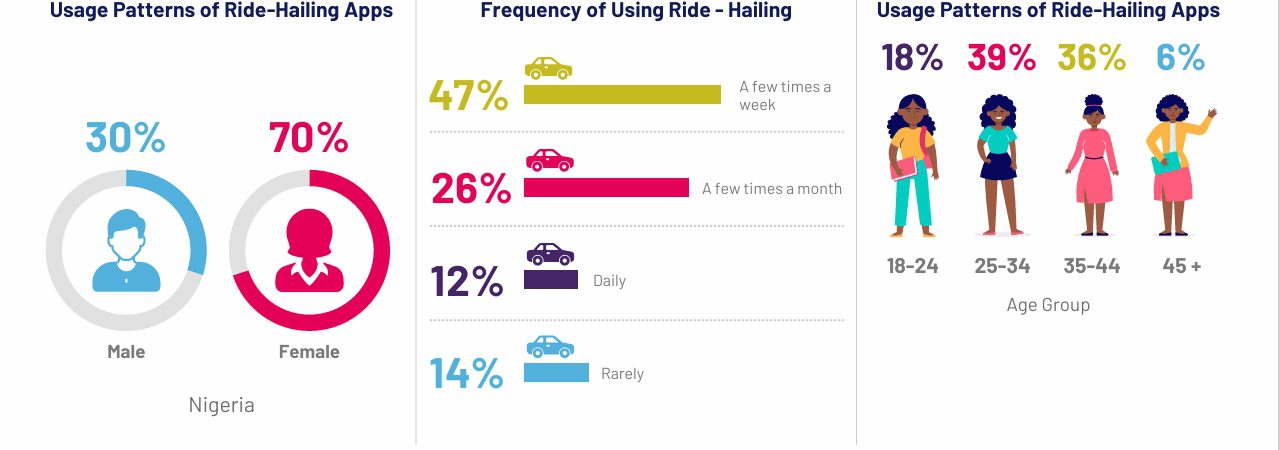







































70% of e-hailing cab users in Nigeria are women- new Bolt report shows
 MM
MM
 WHEN
WHEN
 SFT
SFT
Only 30 per cent of e-hailing passengers in Nigeria are male. This is according to a report titled Ride Hailing Safety Perception Report by Bolt, a leading ride-hailing company in Nigeria, in conjunction with leading research company Ipsos. Conversely, women make up a dominant majority of e-hailing passengers in the country, with 70 per cent.
The report further indicates that only 18 per cent of these women are between the ages of 18 to 24, while 39 per cent of them are between the ages of 25 and 34, making up the largest group of women using ride-hailing apps.
Following closely are women between the ages of 35 and 44, a demographic boasting 36 per cent of female users. Notably, women above 45 make up the least, with only 6 per cent.
On frequency of use, nearly half of all users use it more than once a week, as 47 per cent of respondents admit to using e-hailing services a few times in a week. This represents the highest section of users. 12 per cent of users say they use it daily, while 26 per cent say they use it a few times a month. 14 per cent, however, said they rarely use e-hailing services.
“Ride-hailing adoption in Nigeria is driven by a young, urban, and digitally active population — with women representing the majority of users. Most passengers use ride-hailing apps several times a week, reflecting growing reliance on app-based transport for convenience, flexibility, and safety in everyday mobility,” the report reads.

See also: Bolt launches safety awareness campaign backed by €100 Million investment
e-hailing considered the safest mode of road transport
The Bolt study also revealed that 81% of Nigerian passengers perceive ride-hailing as safer than other transport options. This underscores the growing trust in app-based mobility and its role in enhancing personal safety across cities.
Indeed, nearly all the respondents (96%) said they opt for ride-hailing when public transport feels unsafe, particularly during late-night travel, in unfamiliar areas, or after drinking alcohol. Moreover, 94% have booked rides for family members or friends to ensure their safe return home.
Two-thirds of the respondents (66%) believe ride-hailing apps help reduce drunk driving by offering a reliable and accessible alternative.
According to the report, safety-enhancing features such as real-time GPS tracking (62%), driver verification (58%), and trip sharing (49%) were identified as key tools that increase passenger confidence. The research further highlights that visibility, accountability, and traceability are the strongest factors influencing users’ trust in app-based transport.

The report, based on surveys conducted across major cities, including Lagos, Abuja, Port Harcourt, and Ibadan, explores perceptions of safety across dimensions such as driver trust, in-app security features, vehicle conditions, and contextual factors like late-night or post-event travel.
Speaking about the report and its findings, the General Manager of Bolt Nigeria, Osi Oguah, noted that the research provides valuable insights for his team to improve safety on the platform.
“Safety is at the core of everything we do at Bolt. This research gives us valuable insight into how Nigerians experience and perceive safety when using ride-hailing. We’ll continue to invest in technology, partnerships, and awareness to ensure every ride on Bolt is not only affordable and reliable but also safe,” he said.

Similarly, the Lagos State Commissioner for Transportation, Oluwaseun Osiyemi, commended the effort, noting that it demonstrates a genuine commitment to providing the best safety environment for users.
“The decision by Bolt to commission an independent safety perception study is commendable and forward-thinking. It demonstrates a genuine commitment to listening to users, understanding their concerns, and continuously improving the ride-hailing experience. This reflects the spirit of partnership that drives our collective progress in the transport sector,” he said.

